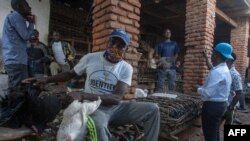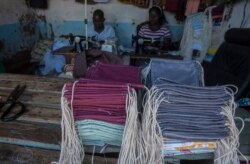Malawi's government will strictly ensure everyone is complying with COVID-19 preventive measures in an effort to curb surging cases of the coronavirus, now averaging more than 200 a day, authorities say.
Figures released by Malawi's Presidential Task Force on COVID-19 show the country confirmed 274 cases and four deaths Thursday — the highest figures in a single day since April when the country recorded its first three cases of the virus.
At a televised press conference Thursday, government authorities attributed the spike to an influx of returnees from South Africa and also a laxity in observing preventive measures imposed in May during the first wave of the coronavirus cases.
Charles Kalemba, principal secretary in the Ministry of Local Government, says the government will make sure everyone is adhering to the measures, which include mandatory wearing of face coverings in public places.
"Meaning, people will be returned from entering offices, shops or restaurants or any public place if they are not wearing a mask," he said. "Water and sanitation buckets should be put at visible places at all times in these public places, [and] strict enforcement of hand washing and usage of hand sanitizers in markets, offices, business premises and other public facilities."
Kalemba says drinking establishments are only allowed to open from 2 p.m. to 8 p.m., and drinking beer at the pubs is banned.
Public gatherings have been restricted to 100 people, and taking food to funerals is prohibited.
"Dead bodies shall be laid to rest within 24 hours," he said. "This was promulgated that time, but I think it was relaxed. But this time around, those managing funeral places must make sure that we do not keep people in one place a long time. The reason here is that the more you keep people together, the more the spread of the disease will be encouraged."
Secretary for Ministry of Homeland Security Kennedy Nkhoma says government will deploy police officers in public places to apprehend those who fail to comply with the measures.
"We are ready to implement all the measures that have been put in place and enforce them as it is," Nkhoma said. "We have the police service, which will be tasked to do the job on behalf of the ministry."
Khumbize Kandodo Chiponda, the Malawi's Minister of Health and co-chairperson of the Presidential Task Force on COVID-19, says the worry is that more than 60 percent of the infections are through local transmission.
This, she adds, is likely to put a strain on health workers and on the capacity of public hospitals.
"In terms of capacity, we have reached 50 percent of our capacity in all our hospitals, meaning the space which we have reserved for COVID-19 patients," Kandodo Chiponda said. "We have to keep in mind that we still have other conditions as well, which also need our health workers to take care of."
The government will recruit more health workers to spread the workload in various health care centers, as the number of COVID-19 patients rises, she says.





